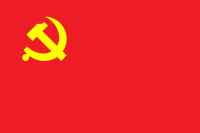"چینی کمیونسٹ پارٹی" کے نسخوں کے درمیان فرق
حذف شدہ مندرجات اضافہ شدہ مندرجات
«{{Infobox political party|name=چین کمیونسٹ پارٹی|native_name={{noitalics|{{nobold|{{lang|zh-hans|中国共产党}}}}}}<br />...» مواد پر مشتمل نیا صفحہ بنایا |
JarBot (تبادلۂ خیال | شراکتیں) م خودکار:تبدیلی ربط V3.4 |
||
| سطر 1: | سطر 1: | ||
{{Infobox political party|name=چین کمیونسٹ پارٹی|native_name={{noitalics|{{nobold|{{lang|zh-hans|中国共产党}}}}}}<br />{{lang|zh-Latn|Zhōngguó Gòngchǎndǎng}}|logo=Danghui.svg|logo_size=125px|colorcode={{Communist Party of China/meta/color}}|general_secretary=[[شی جن پنگ]]|standing_committee={{unbulleted list|شی جن پنگ|[[لی کی چیانگ]]|[[Li Zhanshu]]|[[Wang Yang (politician)|Wang Yang]]|[[Wang Huning]]|[[Zhao Leji]]|[[Han Zheng]]}}|founded={{start date and age|df=yes|1921|7|23}}|headquarters=[[Zhongnanhai]], [[شیچینگ ضلع]], [[بیجنگ]]|newspaper=''[[پیپلز ڈیلی]]''|wing1_title=[[ |
{{Infobox political party|name=چین کمیونسٹ پارٹی|native_name={{noitalics|{{nobold|{{lang|zh-hans|中国共产党}}}}}}<br />{{lang|zh-Latn|Zhōngguó Gòngchǎndǎng}}|logo=Danghui.svg|logo_size=125px|colorcode={{Communist Party of China/meta/color}}|general_secretary=[[شی جن پنگ]]|standing_committee={{unbulleted list|شی جن پنگ|[[لی کی چیانگ]]|[[Li Zhanshu]]|[[Wang Yang (politician)|Wang Yang]]|[[Wang Huning]]|[[Zhao Leji]]|[[Han Zheng]]}}|founded={{start date and age|df=yes|1921|7|23}}|headquarters=[[Zhongnanhai]], [[شیچینگ ضلع]], [[بیجنگ]]|newspaper=''[[پیپلز ڈیلی]]''|wing1_title=[[محفل فکر]]|wing1=[[مرکزی پالیسی محفل فکر]]|wing2_title=[[فوج]]|wing2=[[یپلز لبریشن آرمی]]<br />[[پیپلز آرمڈ پولیس]]<br />[[Militia (China)|چین ملیشیاء]]|membership_year=2017|membership=89,450,000|ideology={{Nowrap|[[چینی کمیونزم]]<ref>{{cite journal|title=China's Foundations: Guiding Principles of Chinese Foreign Policy|journal=Comparative Strategy|volume=20|pages=45–55|quote=''"leaders see maintaining their distinct political ideology as being integral to maintaining their distinct political identity. Although “socialism with Chinese characteristics” may have evolved into something quite different from the communism Mao envisioned"''|doi=10.1080/01495930150501106|year=2001|last1=Kane|first1=Thomas}}</ref><ref>{{cite book |last=Hsiung |first=James |date=1970 |title=Ideology & Practice: The Evolution of Chinese Communism}}</ref><br>[[مارکسیت]]<br>[[چینی خصوصیات کے ساتھ سوشلزم]]<br>[[Chinese unification]]}}|international=[[عالمی محنت کشوں اور کمیونسٹ پارٹیوں کا اجلاس]]|slogan=[[فلاح انسانیت]]{{efn|The slogans at Xinhuamen ("New China Gate", the main entrance to [[Zhongnanhai]]) are "[[Serve the People]]" (middle), "[[Ten thousand years|Long live]] the great Communist Party of China" (left), and "Long live ever-victorious [[Maoism|Mao Zedong Thought]]" (right).|name="Xinhuamen"}}|anthem=<center>"[[انترناسیونال]]" (de facto)<br />[[File:Internationale-cmn (英特纳雄耐尔).ogg|centre|185px]]</center>|seats1_title=[[قومی عوامی کانگریس (چین)]]|seats1={{Composition bar|2119|2980|hex={{Communist Party of China/meta/color}}|per=1}}|seats2_title=[[قومی عوامی کانگریس (چین) کی سٹینڈنگ کمیٹی]]|seats2={{Composition bar|121|175|hex={{Communist Party of China/meta/color}}|per=1}}|flag=[[File:Flag of the Chinese Communist Party.svg|200px|border]]|website={{url|http://cpc.people.com.cn}}|country=چین}} |
||
نسخہ بمطابق 10:36، 6 مارچ 2019ء
中国共产党 Zhōngguó Gòngchǎndǎng | |
|---|---|
 | |
| جنرل سیکرٹری | شی جن پنگ |
| نعرہ | فلاح انسانیت[ا] |
| تاسیس | 23 جولائی 1921 |
| صدر دفتر | Zhongnanhai, شیچینگ ضلع, بیجنگ |
| اخبار | پیپلز ڈیلی |
| محفل فکر | مرکزی پالیسی محفل فکر |
| فوج | یپلز لبریشن آرمی پیپلز آرمڈ پولیس چین ملیشیاء |
| رکنیت (2017) | 89,450,000 |
| نظریات | چینی کمیونزم[1][2] مارکسیت چینی خصوصیات کے ساتھ سوشلزم Chinese unification |
| بین الاقوامی اشتراک | عالمی محنت کشوں اور کمیونسٹ پارٹیوں کا اجلاس |
| ترانہ | |
| قومی عوامی کانگریس (چین) | 2,119 / 2,980 (71%) |
| قومی عوامی کانگریس (چین) کی سٹینڈنگ کمیٹی | 121 / 175 (69%) |
| جماعت کا پرچم | |
 | |
| ویب سائٹ | |
| cpc | |
- ↑ Thomas Kane (2001)۔ "China's Foundations: Guiding Principles of Chinese Foreign Policy"۔ Comparative Strategy۔ 20: 45–55۔ doi:10.1080/01495930150501106۔
"leaders see maintaining their distinct political ideology as being integral to maintaining their distinct political identity. Although “socialism with Chinese characteristics” may have evolved into something quite different from the communism Mao envisioned"
- ↑ James Hsiung (1970)۔ Ideology & Practice: The Evolution of Chinese Communism
